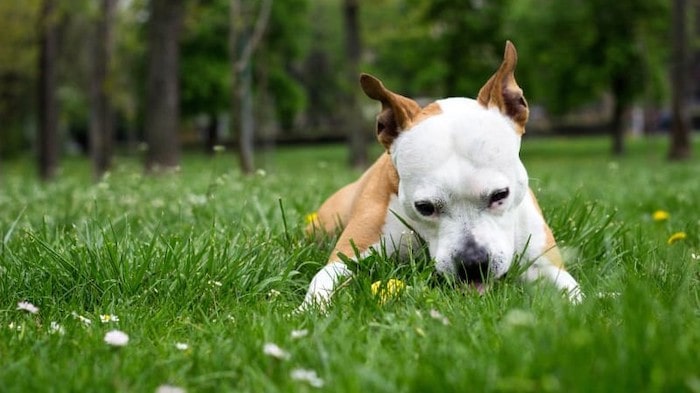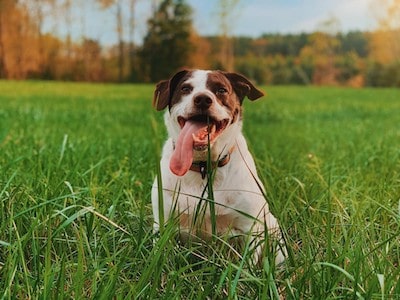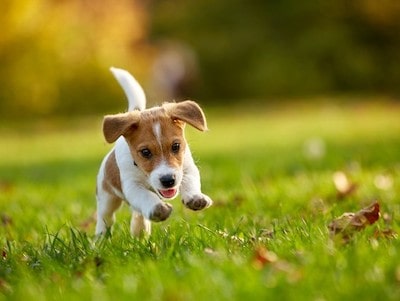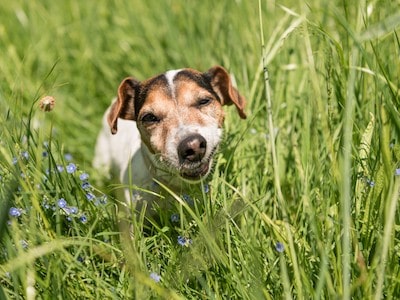Whether you’ve caught your furry friend munching on the lawn or wondered about this curious habit, you’re not alone. Dogs eating grass has been a topic of fascination for pet owners and researchers alike.
In this article, we will delve into the possible reasons behind this behavior, separating fact from fiction and shedding light on what it means for our furry friends’ well-being.
So, let’s embark on this journey to better understand our canine companions and the secrets behind their grassy cravings.
What is Pica and Why do Dogs Eat Grass?
Pica is the technical term for the disorder characterized by eating things that aren’t food. Sometimes pica indicates that your dog has some type of nutritional deficiency, though it is often simply a sign of boredom, especially when practiced by puppies and younger dogs.
Dogs eating grass is actually quite common (it has been observed in wild dogs, too, and may be completely natural) and this form of pica does not usually cause too many problems. In fact, most veterinarians consider it a normal dog behavior.

There are a variety of reasons why your dog might be grazing on your lawn. Some people propose that dogs might turn to eating grass when they don’t feel well as a way to make themselves vomit, and then feel better. Others dispute this idea, on the basis that dogs are not proven to be smart enough to decide to treat an upset stomach by eating grass.
Evidence suggests that most dogs that eat grass aren’t unwell beforehand, or at least they don’t seem so. In fact, fewer than 10% of dogs seem to be sick before eating grass, according to their owners. And grass-eating doesn’t usually lead to throwing up – less than 25% of dogs that eat grass vomit regularly after grazing.
Common Reasons Why Dogs Eat Grass
Dogs eat grass for a variety of reasons, some of which are more clear than others. Here are some of the most common explanations for why dogs eat grass:
- To ease nausea or feelings of sickness: Some dogs may eat grass when they feel unwell, as a way to make themselves vomit and get rid of something that’s upsetting their stomach. This could be due to eating something spoiled, having an infection, or taking certain medications. Eating grass may help them expel the unwanted substance and feel better.
- To fulfill some unmet nutritional need: Some dogs may eat grass because they are lacking some essential nutrient in their diet, such as vitamins, minerals, or fiber. Grass contains some of these nutrients, and may help dogs supplement their dietary deficiency. Fiber, in particular, may help dogs improve their digestion and bowel movements, especially if they are constipated or have diarrhea.

- To relieve boredom or stress: Some dogs may eat grass out of boredom or stress, as a way to cope with their emotions or keep themselves entertained. This could be due to lack of stimulation, exercise, or attention from their owners. Eating grass may provide them with some mental or physical activity, or simply a change of pace from their usual routine.
- To follow their instincts: Some dogs may eat grass because they are following their natural instincts, inherited from their wild ancestors. Wolves and other canids have been observed to eat grass and other plants in the wild, possibly as a source of food, medicine, or cleansing agent. Dogs may have retained this behavior as part of their evolutionary history, and may eat grass instinctively without any specific reason.
- Digestion: Some dogs may eat grass to help with their digestion or to ease the pain and discomfort of bloating or excessive stomach gas. Grass may act as a natural laxative or anti-inflammatory for some dogs.
Benefits and Risks of Dogs Eating Grass
Eating grass is not necessarily bad for dogs, as long as it’s done in moderation and under supervision. In fact, eating grass may have some benefits for dogs, such as:
- Improving digestion: Eating grass may help dogs digest their food better, by adding fiber and bulk to their stool. Fiber may also help prevent constipation and diarrhea, by regulating the water content and movement of the stool through the intestines.
- Inducing vomiting: Eating grass may help dogs vomit when they need to, by irritating their throat and stomach lining. Vomiting may help dogs get rid of something that’s causing them nausea or discomfort, such as spoiled food, toxins, or parasites.
- Adding variety: Eating grass may help dogs add some variety to their diet, by providing them with some different tastes and textures. Grass may also contain some vitamins and minerals that dogs may not get enough of from their regular food.

However, eating grass also has some risks for dogs, such as:
- Causing intestinal problems: Eating too much grass may cause intestinal problems for dogs, such as bloating, gas, cramps, or obstruction. Grass is mostly indigestible for dogs, and may accumulate in their stomach or intestines, causing discomfort or blockage. This may require veterinary intervention to remove the grass and relieve the symptoms.
- Exposing them to pesticides or parasites: Eating grass may expose dogs to pesticides or parasites that may be present on the grass or in the soil. Pesticides may be harmful for dogs if ingested in large amounts, causing poisoning or allergic reactions. Parasites may infect dogs if they ingest their eggs or larvae from the grass or soil, causing diseases such as worms or giardia.
- Toxins: Grass can also contain toxins from plants or mushrooms that grow nearby. Some plants or mushrooms can be poisonous for your dog if they eat them accidentally or intentionally. They can cause symptoms such as vomiting, diarrhea, lethargy, liver failure, kidney failure, etc.
Tips and Advice on How to Prevent or Manage Grass-Eating Behavior in Dogs
If your dog eats grass occasionally and doesn’t show any signs of illness or distress afterward, you don’t need to worry too much about it. However, if your dog eats grass frequently or excessively, vomits regularly after eating grass, or shows any signs of intestinal problems or poisoning after eating grass, you should take some steps to prevent or manage this behavior.
Here are some tips and advice on how to do that:
- Check your dog’s diet: Make sure your dog is getting a balanced and complete diet that meets their nutritional needs. Choose a high-quality dog food that contains enough protein, fat, carbohydrates, fiber, vitamins, and minerals for your dog’s age, size, and activity level. You may also consult your veterinarian about adding some supplements or probiotics to your dog’s diet, if needed.
- Increase your dog’s exercise: Make sure your dog is getting enough physical exercise to keep them fit and healthy. Exercise may also help reduce boredom and stress in dogs, and prevent them from eating grass as a coping mechanism.
Provide your dog with at least 30 minutes of moderate to vigorous exercise per day, depending on their breed and energy level. You may also play with your dog, take them for walks, or enroll them in some dog sports or activities.

- Offer your dog some toys or treats: Make sure your dog has some toys or treats to keep them entertained and stimulated. Toys or treats may also help distract your dog from eating grass, and provide them with some positive reinforcement for good behavior.
Choose some durable and safe toys or treats that your dog likes, and rotate them regularly to prevent boredom. You may also hide some toys or treats around the house or yard, and let your dog find them as a fun game.
- Avoid grass that’s treated with pesticides or infested with parasites: Make sure your dog doesn’t eat grass that’s treated with pesticides or infested with parasites. Pesticides or parasites may harm your dog if ingested, causing poisoning or infection.
Avoid letting your dog eat grass from public parks, golf courses, or other areas that may use pesticides or have parasites. If you have your own lawn, use natural or organic methods to maintain it, and keep it clean and free of parasites.
- Consult your veterinarian: If your dog’s grass-eating behavior persists or worsens, or if your dog shows any signs of illness or distress after eating grass, you should consult your veterinarian as soon as possible.
Your veterinarian may examine your dog and perform some tests to rule out any underlying medical conditions that may cause or contribute to their grass-eating behavior.
Your veterinarian may also prescribe some medications or treatments to help your dog feel better, or refer you to a behaviorist or trainer to help you modify your dog’s behavior.
FAQs
In most cases, eating grass is not harmful to dogs. Many dogs chew on grass without experiencing any adverse effects. However, if the grass has been treated with pesticides or chemicals, it could pose a risk to your dog’s health. Additionally, if your dog consumes large quantities of grass frequently or exhibits other unusual behaviors alongside grass-eating, it’s best to consult your veterinarian for a thorough examination.
While some dogs may vomit after eating grass, it’s not always the case. Eating grass can indeed trigger vomiting in some dogs, possibly due to the grass tickling their throat or stomach irritation. However, it’s essential to differentiate between occasional grass consumption and consistent vomiting, as the latter could indicate an underlying health issue.
If your dog occasionally grazes on grass and shows no signs of distress or illness, there’s usually no cause for concern. However, if you notice excessive grass-eating or it coincides with other worrisome symptoms, like lethargy or loss of appetite, it’s best to consult your veterinarian. They can help determine if there’s an underlying problem that needs addressing.
Providing alternative sources of fiber and plant matter in your dog’s diet might help reduce their grass consumption. Consider offering safe, dog-friendly vegetables like carrots or cucumbers as treats, but always do so in moderation. Remember that every dog is different, so it’s essential to observe how your dog responds to dietary changes.
Conclusion
In conclusion, the enigmatic behavior of dogs eating grass continues to intrigue pet owners and researchers alike. While the exact reasons behind this habit may remain somewhat elusive, we’ve explored various theories that shed light on the possible motivations. From instinctual behaviors to potential dietary needs or simple exploration, dogs’ grass consumption appears to be a multi-faceted phenomenon.
Remember, in most cases, occasional grass-eating is not harmful to dogs. However, it’s crucial to stay vigilant and consult a veterinarian if you notice any concerning symptoms or if the behavior becomes excessive. Your dog’s health and well-being are of utmost importance, and understanding their unique needs will enable you to provide the best care possible.
As responsible pet owners, let’s continue to observe and appreciate our furry friends’ individual quirks while ensuring their safety and happiness. Whether they’re nibbling on grass, chasing their tails, or wagging their tails with joy, the bond we share with our canine companions is one to cherish and nurture.

Ellis is a retired veterinary technician and full-time contributor at DogLovesBest. He likes writing about pet health care tips and reviews the products that are useful for fidos on a daily basis.
Ellis also guardians a Siberian husky, Nova, and a cat named Shilly. They all live happily with his wife Ammy, and both the dogs on a seaside apartment in Queens, NY.
